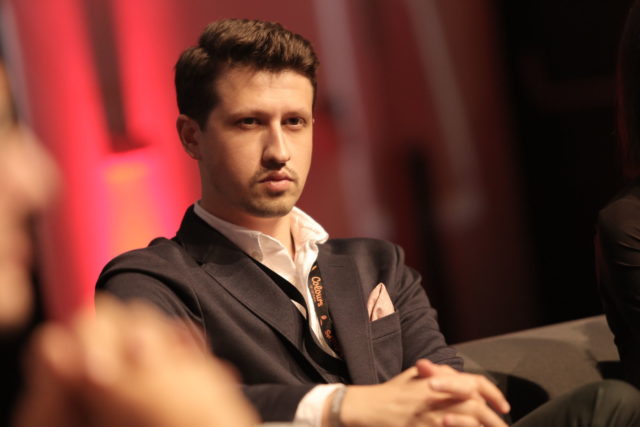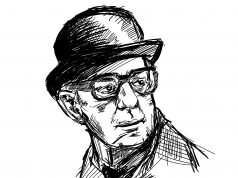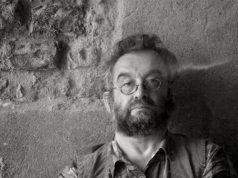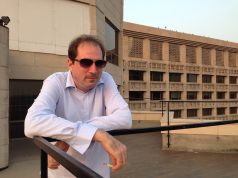A co-founder of Ukraine’s path breaking Hromadske Internet television station, Maxim Eristavi is one of the most widely known openly gay people in Ukraine. The Odessa Review asked the well known American journalist James Kirchick, fellow with the Foreign Policy Initiative and author of the forthcoming book, The End of Europe: Dictators, Demagogues and the Dawn of a New Dark Age, to engage in a conversation with him about the situation of LGBT life in Ukraine. This conversation became especially timely after Odessa hosted its first LGBT pride parade and demonstration on August 13th, 2016.
Odessa Review (James Kirchick): It appears that there has been a burst of LGBTI visibility in Ukrainian life post-Maidan; you are yourself an example of this new visibility. What was it about the Maidan that made LGBTI people more assertive?
Maxim Eristavi: I wouldn’t go as far as to call it “a burst.” Two years since the Maidan, I’m still the only openly gay journalist in the country of 42 million. Yes, local LGBTI activists are more outspoken, and gay Ukrainians now have more powerful allies – a number of members of the parliament, vice prime minister for European integration, Kyiv police chief and Kyiv mayor among them, we’ve just had the first ever violence-free Kyiv Pride, for which I secured the participation of the EU parliament’s members. So I feel like the pivotal moment is already here, the conversation about denying equal rights to queer Ukrainians is transforming from marginal to mainstream. I’m sure our change of rhetoric among equality fighters has helped a lot: instead of lobbying on behalf of expanding civil rights for specific groups, we instead appealed to universal values, like freedom of expression, protection from violence, freedom of speech. The Ukrainian public has responded. This year I heard so many people saying that maybe they still don’t understand the concept of queer rights, but that they felt outraged when a peaceful civil rights march (Kyiv Pride) was threatened by Neo- Nazi thugs. This is not something that post- Maidan, the country would tolerate ever again. It fills me with pride to see how much of a difference two years have done for this country after we were forced to cancel Kyiv Pride in the first post-revolution year amid violent threats and police indifference. Still, the end of the tunnel is years ahead: when it comes to openly queer Ukrainians, I can count them on the fingers of two my hands, with almost all of them are being LGBTI activists. Outside of Kyiv there is a land of fear and violence where almost nobody would ever dare to come out amid zero protection from violence and discrimination that this state can offer us.
OR: Can you describe what the atmosphere was like before Maidan? How did Ukraine compare to other post-Soviet countries, and how would you say it ranks today?
ME: Eastern Europe is a primary example of the constructed nature of homophobic hate. Obviously, during Soviet times a ban on homosexual relationships was ruthlessly enforced. But right after communism’s collapse in the region, queer culture quickly emerged with Moscow and Kyiv becoming massive hubs for gay people all around the former Soviet Union. Ukraine was the first country in the former communist block to decriminalize homosexuality. Unfortunately, progress is reversible. Things turned ugly in the mid 2000’s with the emergence of institutional hatred towards gay people in Russia, where its political elites used gays as a tool to deflect attention from increasingly authoritarian regime. It is always easier to distract the public by cultivating the myth of ‘the enemy within.’ International religious groups jumped on the trend very quickly. Feeling like they are losing the battle at home, many American evangelical groups supplied local churches with superbly crafted homophobic strategies. Their exported globalized homophobia took root in the developing world, exploiting the insecurities of local societies which were under increasing pressure of disruptive globalization. Moreover, Russia went ‘creative’ by becoming the first state in human history to implement homophobia as part of official foreign policy. Through numerous political satellites all around the region, the Kremlin has implanted hatred based policies, such as the outrageous ‘anti-gay propaganda’ laws. This provoked a spike in levels of homophobia from the Baltic states to the Caucasus. The Maidan revolution with its strong message of citizen equality was a promising development for queer Ukrainians. Unfortunately, local LGBTI groups with their strong dependence on foreign donors and almost nonexistent grassroots links, failed to capitalize on the movement. Sadly, where Russian foreign policy left off, the cause of homophobia in Ukraine was quickly picked up by radical far-right militias. Surging levels of violence and unrestricted hate speech in 2014-2015 made the situation with queer rights in Ukraine quite horrible. I’ve never seen anything like it before. It is not like Ukrainians suddenly became more violent or homophobic. Yet, I blame the reluctance of the state to condemn far-right violence in a tactical attempt to keep these groups as possible allies in the future. In recent months it has become quite obvious that many Ukrainian politicians are set to use homophobic tactics as an effective ‘electoral deflector’ in these uncertain times. It is easier for them to divide the society along clear gay- non gay line, than to admit their lack of reformist agenda. Still the situation in Ukraine at the moment is promising, as many countries in the region (Moldova, Poland, Georgia) keep rolling back rights. At the same time, it is dangerously fragile, with empty promises sitting in the place of basic protective legislation. Continuing international pressure helps in withstanding the comeback of institutional homophobia in Ukraine, but with growing ‘Ukraine fatigue’, I’m not sure how long we can keep up our defenses.
OR: Let’s talk more about the issue of international pressure with regard to LGBTI rights. How effective has it been in Ukraine and how would you rate Western governments and multinational institutions like the EU in that regard?
ME: The international support has been incremental for strengthening the equality fight in Ukraine over the past two years, but I doubt that our foreign friends understand the importance of this fight. I feel strong and growing support for LGBTI movement in Ukraine from a number of European governments. Three members of the European parliament marched together with Kyiv Pride people this year, the first time ever. As a civil rights advocate I receive a very warm welcoming all around Europe and North America. Our relationships haven’t been an easy road, though. Two years ago the issue of rising LGBTI violence in Ukraine was completely ignored by both our American and European partners. In early 2014, all the anti-discrimination laws where completely scrapped from the EU – Ukraine trade and visa talks. Back then, amid intensifying hate speech and violence, most foreign governments (as well as international LGBTI groups) kept silent. ‘It is not as bad as in Russia,’ some diplomats would brush me off. Step by step, meeting by meeting, story by story, broadcast by broadcast, I was relentlessly trying to push the issue into the mainstream. Honestly speaking, 90% of the time I didn’t feel like theres was any change possible. Two years later, thanks to joint efforts by our allies abroad and brave queer fighters back in Ukraine, the LGBTI issue is not a side gig for foreign diplomats anymore. Still, the understanding of the problem’s scope is not really there yet. Ukraine is a massive frontline in the fight against globalized homophobia. Long gone are those times when LGBTI progress would depend on merely local historic path-dependency. Homophobia all around the world has the backing of powerful international groups, which often include both governments and churches. Losing a country the size of Ukraine to them would surely open the door for institutionalized homophobia taking over the whole region. We also desperately need to change development tactics as well: there is growing empirical evidence that the path to consolidated democracy and a vibrant and creative society lies through human rights and civil rights equality. We can not ignore that fact when trying to build a better Ukraine.
OR: Can you tell us about your own coming out process as a public figure? How have your fellow Ukrainians responded? Any surprises?
ME: My coming out is still happening. Moreover, I’m not sure it will ever end. I came out to myself quite early, even before school. Later, I came out to friends and to my parents. But the country hated me and I hated it back. So I escaped. By the time I had moved out of Ukraine, I thought that was it, and it was the end of my coming out and it was now time to settle for a comfortable life as a gay man in some Western country where people would actually treat me as equal human being. It turned out however that is not something that would bring me peace. Running away is not what I should do, I began to understand. So I stopped, turned around and started fighting back. First, I felt like it would be honest and crucial to come out to my audience – as a journalist covering a lot of LGBTI issues it wasn’t fair for me to keep my personal involvement out of the story. As for English-language journalists, that coming out was largely aimed at a foreign audience. After people started translating my stories into Russian and Ukrainian, the eventual public coming out at home happened as well. At the moment I work great deal on building up international support for Ukraine and specifically for queer Ukrainians, but back at home I also try to speak out about my own struggle as a gay man hoping that it will help someone to avoid that toxic loneliness and alienation I went through as a kid. Of course, by doing so I opened myself to a torrent of hate messages and even death threats. So many people, driven by hate, try to deny my journalism and foreign policy work as a part of my sexual identity. But what surprises me the most is the level of support that I have gotten as well. Sometimes people write me from places like Afghanistan and Oman, saying that my struggle resonates with them. But most importantly, I receive moving messages from fellow Ukrainians. Once a young kid wrote me telling me that my text had helped him to come out to his parents. I cried for maybe half of that day. As long as there is that one kid somewhere in provincial town or village in Ukraine for whom my story helped to find a bit of courage and hope, I will keep coming out over and over again, sharing my story and fighting for equality. Coming out is a state of mind for me.
OR: You have been a pioneer in using new media to tell the Ukrainian story. How would you say that it has impacted LGBTI visibility and acceptance?
ME: Twitter has made me into who I am. It has been a crucial force behind all my attempts to spread the Ukrainian story out, to help me find allies and reach out to new people all over the world. I think quite the same dynamic is happening between Facebook and other equality fighters in Ukraine. Utilizing social media networking, they’ve been able to dramatically expand the reach of their message. At the same time social media is just a tool, it doesn’t fix core issues, doesn’t make anything better or worse, just magnifies and exacerbates already existing communication trends. The trick is to know how to exploit the perks it offers and mitigate the risks that come with it. So for example, together with expanding support and networking, social media also brought a much easier access to me for haters and bullies. Some days it is overwhelming.
On the other hand, many Ukrainian civil society activists and young politicians surround themselves with what I refer to as the “Facebook bubble.” They spend so much time and energy in communicating between themselves over social media, having debates, launching digital campaigns and protests. I find it to be a horrible waste of time in a country that has merely a 60% internet access rate, with Facebook or Twitter not being even the most popular social media networks. If you are a Facebook user in Ukraine, names like Mustafa Nayem, Serhiy Leschenko or Svitala Zalischuk (all are reformist MPs) are iconic. But recent poll show that those names don’t ring a bell for the general public. The same is true with equality fighters. I have a substantial number of followers on Twitter. Not Rihanna-kind of levels, but more than 21,000. Despite being moderately known abroad in media, political and diplomatic circles, I know for sure that 99% of Ukrainians haven’t heard my name, yet. That’s something that I have just began fixing. Others young leaders in Ukraine should abandon that ‘Facebook bubble’ as soon as possible if they want to stay effective agents of change.
OR: Is homophobia so bad in Ukraine that LGBTI people need to seek asylum elsewhere? Do you think that your decision to stay in Ukraine is an indication of your willingness to “fight” for the cause rather than flee from it?
ME: There are plenty of people whom I know who have left the country in fear for their lives or at least in pursuit of a place where people will treat them as fundamentally equal human beings. We have no right to judge them, as living in fear or in an environment full of hate is not something a person should settle for. If they decide to seek asylum, I always try to help them in any way that I can, providing useful information and connecting with the right people. Moreover, some of the most supportive and tightest knit communities of Russian and Ukrainian queer people have formed abroad, which is something that we lack back at home. These are our strongest allies, providing us with all kinds of help and a great deal of inspiration. Very often these people become an incremental part of change back at home, despite being forced to flee the country. So no, I don’t see any difference between those who left and those who, like myself, have stayed. I would never allow myself to blame queer Ukrainians for quitting their country when it has been refusing them basic rights since forever. That’s why, despite all of this, I always marvel at the energy and willingness of Ukrainian asylum seekers or queer emigrants to continue to contribute to the equality fight in their former home.




































